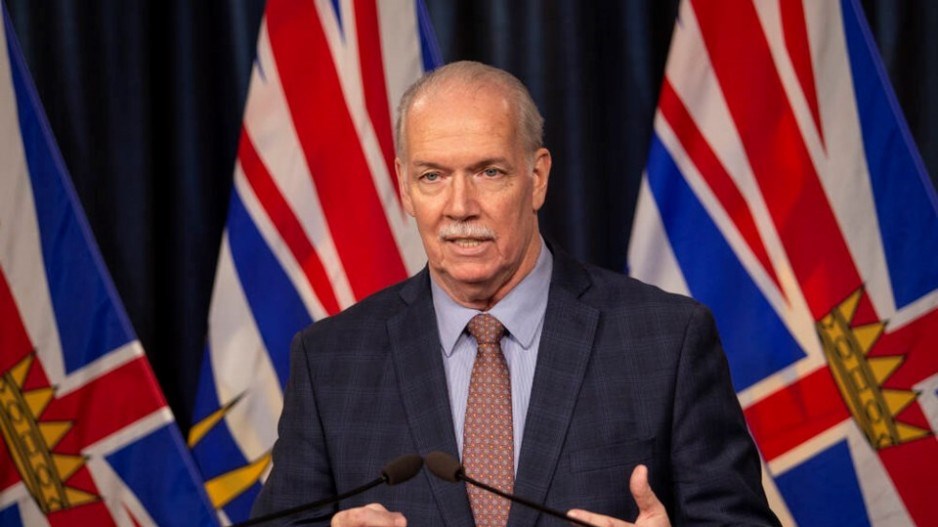Nary an economic hot potato seemed to damage Premier John Horgan’s popularity during his five-year (and counting) run as B.C.’s leader.
Not the Site C dam, the Trans Mountain pipeline expansion and the replacement of Medical Service Plan (MSP) premiums that shifted the burden from workers to businesses.
Throw in a pandemic that cast a pall of uncertainty over the economy as well as COVID-19 restrictions that made retailers, restaurateurs and tourism operators blanche on a daily basis, and Horgan still charted a path for a new BC NDP identity that subverted the expectations of many a British Columbian.
Coming off a two-day cabinet retreat, the premier announced Tuesday he would not be seeking re-election and that a fall leadership convention would tap a new party leader. Until then, Horgan remains premier after a second successful battle against cancer.
“There's been a decisiveness about some of those megaprojects that has been, I think, probably a good thing,” said UBC political science Prof. Allan Tupper.
“The traditional critique of the NDP as big spenders, and debt raisers and all that has been [turned] on its head.”
A February poll conducted for Glacier Media by Research Co. showed Horgan had an approval rating of 69 per cent compared with the lesser-known Kevin Falcon, who won the BC Liberal leadership race in May, at 38 per cent.
The BC NDP, with a 46 per cent approval rating, was notably less popular than its own leader in that same poll. The BC Liberals’ approval rating matched that of its now-leader at 38 per cent.
Horgan’s tenure leading the province began with some mixed results overseeing major economic undertakings.
B.C.’s real gross domestic product (GDP) grew by 3.8 per cent in 2017, the year the BC NDP squeaked in to form a minority government after striking a deal with the BC Greens.
Weeks later, global energy giant Petronas announced it was pulling the plug on the $36-billion Pacific NorthWest LNG project – widely viewed as signal from the industry that it had little confidence in B.C. as a place to invest. But just over a year later, the companies behind the $40-billion LNG Canada project announced a final investment decision.
One of the Horgan government’s first moves was to refer the controversial Site C dam project, which was already under construction, to the B.C. Utilities Commission for review.
Despite the fact the project was forecast to end up costing billions more than budgeted, Horgan decided to finish it since the alternative would be a $4-billion write-off with no additional power to show for it.
And Horgan’s intense opposition to the Trans Mountain pipeline expansion didn’t stop that project from going ahead. Instead, owner Kinder Morgan Inc. (TSX:KMI) sold the project to the federal government in 2018 for $4.5 billion.
The party’s first budget, tabled in February 2018, eventually delivered a $1.5-billion surplus. But during Horgan’s first full year in office, GDP growth slowed to 2.2 per cent.
“Governments don't make economies, they shape them in different ways. They can pursue policies that impact them,” Tupper said. “But at the end of the day, you get what you get, and his circumstances have been quite favourable.”
The global economy screeched to halt during the first year of the pandemic, with B.C.’s economy contracting 3.8 per cent in 2020. But the West Coast outperformed all the other large provinces during the 2021 bounce-back (+6.2 per cent).
The Horgan government eliminated MSP premiums in 2020, shifting the $2-billion burden to employers in the form of a new employer’s health tax.
The government under his leadership managed to continue to bring down balanced budgets until the pandemic hit, sending subsequent budgets into deficit.
The 2021 deficit was originally expected to be as high as $9.7 billion, but the 2022 budget forecast it to be just $483 million.
With an array of balanced budgets and even surpluses, and a relatively low debt-to-GDP ratio, B.C. has generally maintained a strong credit rating from most credit rating agencies under Horgan's leadership.
B.C.'s credit rating took a dip in 2021, due to the impacts of the pandemic on its budget, with Fitch bumping B.C.'s credit score from AAA to AA+.
But despite the impacts of the pandemic on B.C.'s budget and finances, its credit rating remains relatively good, with Moody's giving B.C. an Aaa (stable) credit rating in 2022 and S&P Global Ratings giving it AA+.
“This is a government that has shown a real pragmatic streak and a willingness to back up, admit mistakes and change course,” said SFU political science lecturer Stewart Prest, pointing to Horgan’s decision earlier this month to scrap the $800-million rebuild of the Royal B.C. Museum.
Prest also pointed to other economic legacies of the Horgan government, such as turning the ICBC “dumpster fire,” as it was described by Attorney General David Eby, towards profitability and ushering in measures aimed at curbing the demand side of the housing market, such as the foreign-buyers tax.
“This is not a revolutionary government,” Prest said. “So far they've managed to walk that line and build a pretty robust voting coalition combining urban voters with the growing suburban and exurban areas around the Lower Mainland and parts of the Island.”
With Horgan deciding to go out on his own terms, Prest said the contrast could not be greater when compared with Alberta Premier Jason Kenney, who announced last month he would stand down at a later date as leader of his province’s United Conservative Party after narrowly winning a leadership review.
“That legacy of sound competent governance has fed into the trust for John Horgan as an individual leader,” Prest said. “He's a leader able to go out when he's more or less on top of things.”




